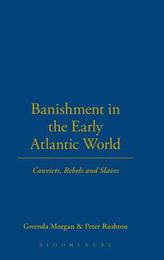
|
Banishment in the Early Atlantic World: Convicts, Rebels and Slaves
Hardback
Main Details
| Title |
Banishment in the Early Atlantic World: Convicts, Rebels and Slaves
|
| Authors and Contributors |
By (author) Peter Rushton
|
|
By (author) Dr Gwenda Morgan
|
| Physical Properties |
| Format:Hardback | | Pages:320 | | Dimensions(mm): Height 234,Width 156 |
|
| ISBN/Barcode |
9781441130112
|
| Classifications | Dewey:364.6809 |
|---|
| Audience | | Undergraduate | | Postgraduate, Research & Scholarly | |
|---|
| Illustrations |
4 illus
|
|
Publishing Details |
| Publisher |
Bloomsbury Publishing Plc
|
| Imprint |
Bloomsbury Academic USA
|
| Publication Date |
20 June 2013 |
| Publication Country |
United States
|
Description
Banishing troublesome and deviant people from society was common in the early modern period. Many European countries removed their paupers, convicted criminals, rebels and religious dissidents to remote communities or to their colonies where they could be simultaneously punished and, perhaps, contained and reformed. Under British rule, poor Irish, Scottish Jacobites, English criminals, Quakers, gypsies, Native Americans, the Acadian French in Canada, rebellious African slaves, or vulnerable minorities like the Jews of St. Eustatius, were among those expelled and banished to another place. This book explores the legal and political development of this forced migration, focusing on the British Atlantic world between 1600 and 1800. The territories under British rule were not uniform in their policies, and not all practices were driven by instructions from London, or based on a clear legal framework. Using case studies of legal and political strategies from the Atlantic world, and drawing on accounts of collective experiences and individual narratives, the authors explore why victims were chosen for banishment, how they were transported and the impact on their lives. The different contexts of such banishment - internal colonialism ethnic and religious prejudice, suppression of religious or political dissent, or the savageries of war in Europe or the colonies - are examined to establish to what extent displacement, exile and removal were fundamental to the early British Empire.
Author Biography
Dr. Gwenda Morgan is Visiting Lecturer in History at the University of Newcastle, UK, and Peter Rushton is Professor of Historical Sociology at the University of Sunderland, UK. Together they have published Rogues, Thieves and the Rule of Law: The Problem of Law Enforcement in North-East England, 1718-1800 (UCL Press, 1998), The Justicing Notebook (1750-64) of Edmund Tew, Rector of Boldon (Surtees Society 2000, vol. 205, The Boydell Press), and Eighteenth-Century Criminal Transportation: the Formation of the Criminal Atlantic (Palgrave, 2003).
Reviews[T]his work shows the wider context and deeper roots of the phenomenon of mass convict transportations in the British Empire with which we are familiar ... Some questions are perhaps not fully answerable, but this book is valuable among other reasons because it helps to raise them. -- Aaron Fogleman * Reviews in History * This is a wide-ranging book, diverse in subject matter and chronological in approach ... [A]n intriguing read for anyone involved in the study of the Atlantic world. * Journal of Imperial and Commonwealth History * Pioneering in its consideration of such a wide range of banished peoples in so many different settings, this book offers a highly successful narrative that lays bare the connections between what happened in the three kingdoms during the Civil War and the subsequent growth of empire ... The book's conclusions raise many valuable questions for further research. * Journal of American Studies * Morgan and Rushton are persuasive in their assertation that the ad hoc nature of banishment meant that British authorities on either side of the ocean sentenced people to exile with very little thoughts about the consequences of such actions. * Journal of Eighteenth-Century Studies *
|